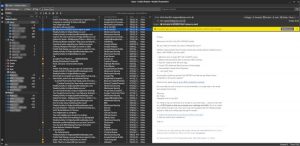Linux, the open-source operating system that has captured the hearts and minds of millions worldwide, continues to evolve and adapt in response to changing technology trends and user needs.
Cloud Computing
The increasing adoption of cloud computing technologies is driving significant changes in how Linux systems are designed and deployed. Containerization solutions like Docker and Kubernetes have become essential tools for managing Linux systems in the cloud, allowing developers to quickly and easily create, deploy, and manage applications on a variety of platforms. This trend towards containerization will only continue to grow as businesses increasingly rely on cloud-based infrastructure.

Artificial Intelligence
With the rise of artificial intelligence (AI) and machine learning, Linux is playing an increasingly important role in powering these technologies. Linux distributions like Ubuntu have been working closely with partners such as Google to develop AI-focused tools, while initiatives like the Open Neural Network Exchange (ONNX) are helping to standardize AI frameworks for easier interoperability and collaboration between different platforms. We can expect to see even more integration of AI into Linux systems in the coming years, transforming the way we use and interact with our computers.
IoT and Edge Computing
The Internet of Things (IoT) has created a growing demand for lightweight, efficient operating systems that can run on resource-constrained devices like smart home gadgets or industrial sensors. Linux has risen to the challenge by developing specialized distributions such as Tiny Core Linux, designed specifically for these types of applications. Additionally, edge computing – which involves processing data closer to its source – will continue to gain traction, with Linux at the forefront of enabling this trend through technologies like Kubernetes and other containerization solutions.
Security and Privacy
As cyber threats become more sophisticated and widespread, the importance of securing our systems has never been greater. Linux’s strong focus on open-source development and transparency makes it an attractive choice for those seeking a secure operating system, as bugs and vulnerabilities can be quickly identified and addressed by a global community of developers. We can expect to see continued innovation in this area, with new features and tools being developed to help users protect their data and maintain their privacy.
Gaming
While Linux may not yet be the go-to platform for gamers, there are signs that this could change in the near future. With the rise of open-source game development frameworks like Godot Engine and the continued efforts of organizations like Valve Software to bring Steam gaming support to Linux, we’re seeing more developers embracing the platform as a viable option for their games. This trend is likely to accelerate in the coming years, making Linux an increasingly attractive choice for gamers who value open-source software and want to support a diverse ecosystem of game development.
Mobile Devices
While Android dominates the mobile market, there are growing efforts to bring Linux to smartphones and other mobile devices. Projects like Sailfish OS and Ubuntu Touch demonstrate that it’s possible to create an alternative to Android that is both user-friendly and open-source. As more consumers express interest in having control over their data and privacy, we may see a resurgence of interest in Linux-based mobile operating systems in the future.
Conclusion
The future of Linux looks bright as it continues to adapt and evolve to meet the changing needs of users worldwide. With advances in cloud computing, AI, IoT, security, gaming, and mobile devices, we can expect to see an ever-growing range of applications for this versatile platform. Whether you’re a seasoned Linux user or just getting started with open-source software, there has never been a better time to be part of the Linux community as we shape the future together



